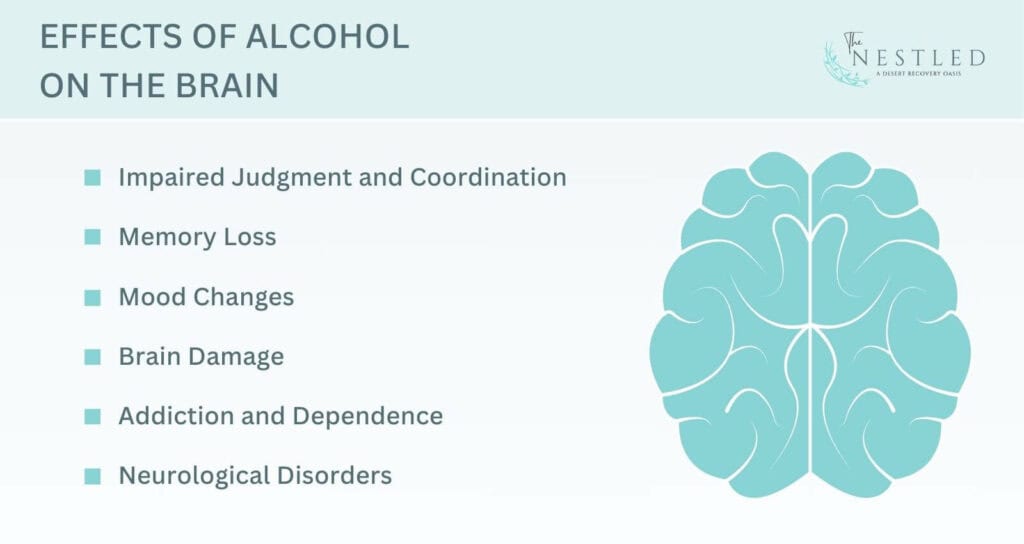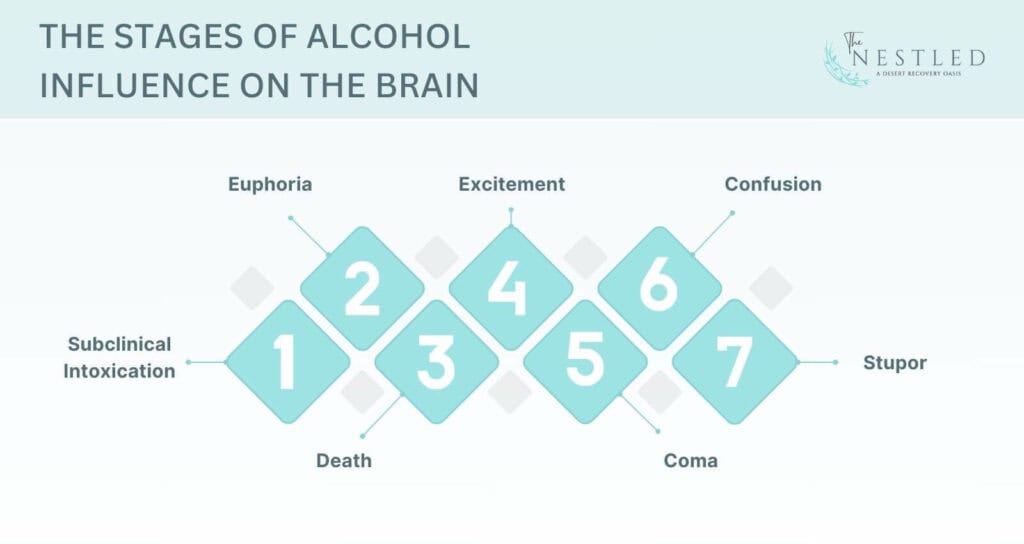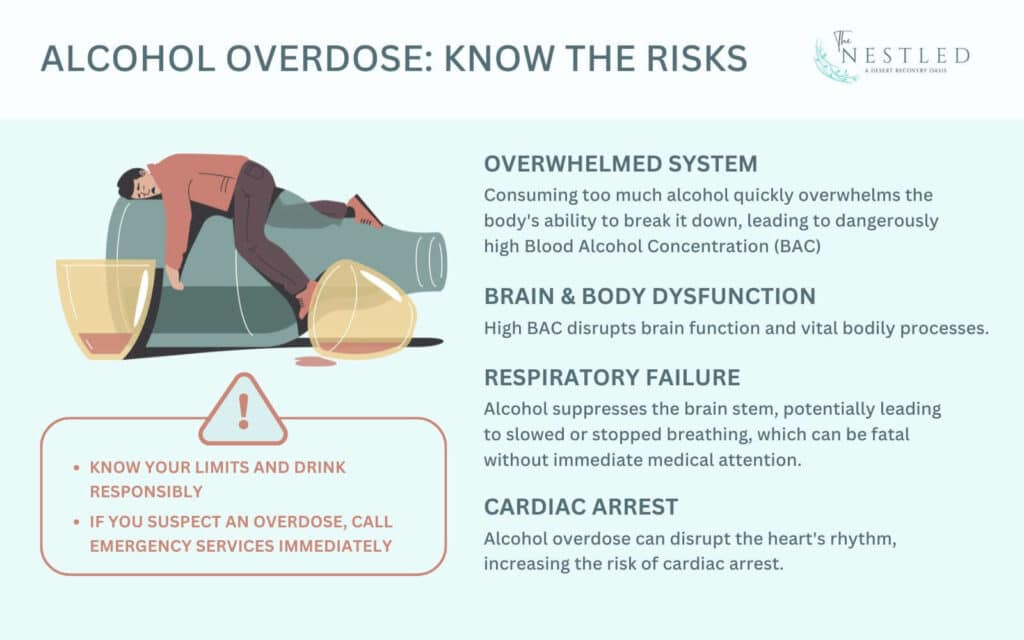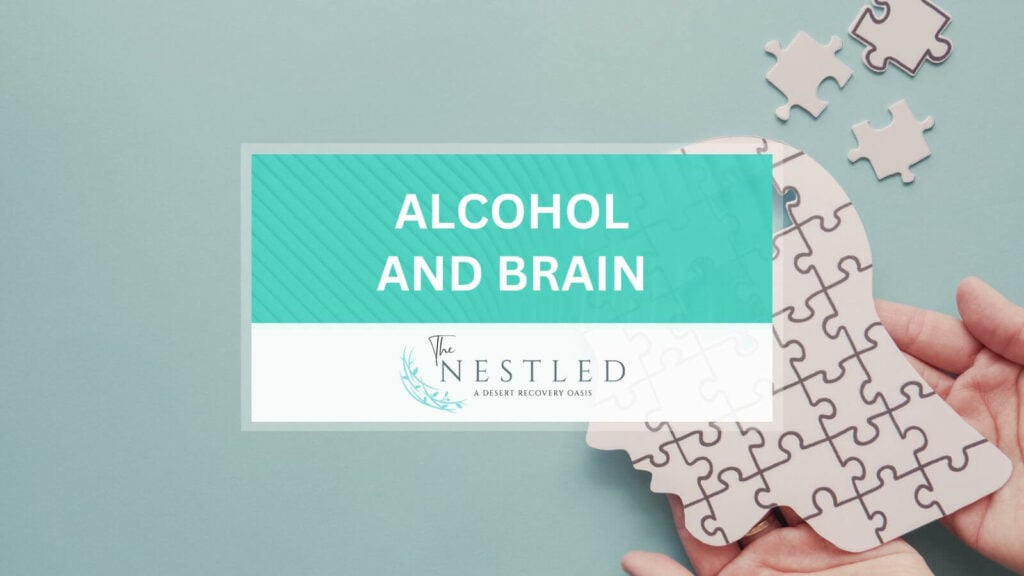Alcohol is a psychoactive substance found in drinks like beer, wine, and spirits. It is commonly used for social, recreational, and sometimes medicinal purposes. A survey conducted by American Addiction Centers reveals that 71% of music festival attendees in the US consume alcohol, with 22% drinking to the point of intoxication, and 43% using drugs.
When consumed in excess, alcohol causes various health issues. The effects of alcohol include impaired judgment, coordination, and reaction times. As the NIAAA states, alcohol disrupts the brain’s communication pathways, and affects both its structure and function.
Alcohol affects the brain by disrupting neurotransmitter levels, which impairs cognitive and motor functions. Chronic alcohol consumption leads to brain damage, resulting in memory loss, Wernicke-Korsakoff syndrome, learning difficulties, and psychiatric disorders like depression and anxiety.
What is termed as drinking “too much” alcohol is taking a quantity that exceeds the recommended limits of moderate drinking. Moderate drinking is not more than one drink per day for women and not more than two drinks per day for men.
Some effects of alcohol on the brain are treatable, particularly with early intervention. Cognitive functions and mental health improve with prolonged abstinence, a healthy lifestyle, and therapeutic support.
What Happens To The Body When Alcohol Is Consumed?
According to doctors at Northwestern Medicine, when alcohol is consumed, it is quickly absorbed into the bloodstream through the lining of the stomach and small intestine. From there, it travels to various organs, affecting their function. Initially, alcohol impacts the central nervous system, acting as a depressant.
As a depressant, alcohol leads to feelings of relaxation and lowered inhibitions but also impairs cognitive and motor functions, resulting in slurred speech, delayed reaction times, and impaired judgment.
In the liver, alcohol is metabolized by enzymes, primarily alcohol dehydrogenase, into acetaldehyde, a toxic substance that is further broken down into less harmful compounds. The liver processes only about one standard drink per hour; consuming alcohol faster than this rate leads to increased blood alcohol concentration (BAC).
High BAC overwhelms the liver’s capacity to metabolize alcohol, resulting in the buildup of acetaldehyde, which contributes to hangovers and long-term liver damage, such as fatty liver, hepatitis, and cirrhosis.
What Are The Effects Alcohol Has On The Brain?
The six effects alcohol has on the brain are impaired judgment, memory loss, mood changes, brain damage, addiction, and neurological damage. An Oxford University research shows that participants in the study who drank four or more drinks a day had almost six times the risk of hippocampus shrinkage compared to nondrinkers.

Alcohol affects the brain by changing the neurotransmitter levels, leading to impaired cognitive and motor functions and long-term damage.
- Impaired Judgment and Coordination: Alcohol disrupts the balance of neurotransmitters, particularly gamma-aminobutyric acid (GABA) and glutamate, which results in impaired judgment, coordination, and reaction times. This impairment leads to risky behaviors and accidents.
- Memory Loss: Both short and long-term memory are affected by alcohol consumption. Binge drinking causes blackouts, where the person is unable to recall events, while chronic alcohol use leads to persistent memory problems and conditions like Wernicke-Korsakoff syndrome.
- Mood Changes: Alcohol influences the levels of serotonin and other neurotransmitters that regulate mood, leading to temporary mood swings, depression, and anxiety. Long-term use exacerbates these mental health issues and leads to more severe psychiatric disorders.
- Brain Damage: Chronic heavy drinking causes significant brain damage, including a reduction in brain volume, especially in the frontal lobe, responsible for executive functions such as decision-making and self-control. This damage increases the risk of lasting cognitive deficits.
- Addiction and Dependence: Regular alcohol consumption alters the brain’s reward system, leading to addiction and dependence. This addiction makes it difficult for individuals to stop drinking despite adverse consequences, further perpetuating the cycle of alcohol abuse and its effects on the brain.
- Neurological Disorders: Prolonged alcohol abuse increases the risk of neurological disorders, such as Wernicke-Korsakoff syndrome. This condition causes severe memory impairment, confusion, and coordination problems and is caused by a deficiency of thiamine (vitamin B1), often associated with chronic alcohol consumption.
According to the Institute for Alcohol Abuse and Alcoholism, alcohol makes it harder for the brain areas controlling balance, memory, speech, and judgment to do their jobs, resulting in a higher likelihood of injuries and other negative outcomes.
Understanding these effects highlights the importance of moderating alcohol intake and seeking help if alcohol use becomes problematic.
What Are The Stages of Alcohol Influence on The Brain?
According to Alan Wayne Jones’s 2024 ‘Dubowski’s stages of alcohol influence and clinical signs,’ the different stages of alcohol influence on the brain are subliminal intoxication, euphoria, excitement, confusion, stupor, coma, and death.

Alcohol impairs cognitive and motor functions, altering mood and potentially causing long-term damage.
- Subclinical Intoxication: At low levels, alcohol consumption causes subclinical intoxication, where individuals experience mild impairment in judgment and coordination. These effects may not be noticeable to the person drinking but still impact their ability to perform tasks requiring focus and precision.
- Euphoria: As blood alcohol concentration (BAC) rises, euphoria sets in. This phase is characterized by increased sociability, lowered inhibitions, and heightened mood. Individuals feel more confident and relaxed, but their ability to make rational decisions is compromised.
- Excitement: With further alcohol consumption, the excitement phase begins, marked by significant impairment in motor coordination and cognitive functions. Speech becomes slurred, reaction times slow down, and balance is affected. Memory lapses and impaired judgment are common in this stage.
- Confusion: At higher BAC levels, confusion occurs. Individuals experience severe disorientation and difficulty in focusing. Individuals lose recognition. Their behavior becomes erratic, and they exhibit emotional instability, such as sudden mood swings or aggression.
- Stupor: Entering the stupor phase, a person’s ability to respond to stimuli significantly diminishes. They become unable to stand or walk, and their speech becomes incoherent. Vomiting, incontinence, and a lowered body temperature (hypothermia) are common. This stage is dangerous and requires medical attention.
- Coma: If BAC continues to rise, the individual falls into a coma. This state involves complete unconsciousness and unresponsiveness to external stimuli. The person’s breathing becomes slow and irregular, and their body temperature drops further, posing a severe risk to life.
- Death: At highly high BAC levels, alcohol depresses vital life functions to the point of causing death. Respiratory failure, heart arrhythmias, and severe hypothermia are common causes of death in alcohol poisoning cases. Immediate medical intervention is crucial to prevent fatal outcomes.
What Is The Risk Of Alcohol On An Adolescent Brain?
The risk of alcohol on an adolescent brain includes impaired brain development, memory issues, and increased vulnerability to addiction. According to NIAA, Adolescent brains are more vulnerable to the harmful effects of alcohol than adult brains—adolescents who consume alcohol experience long-term cognitive deficits and emotional problems.
During adolescence, the brain undergoes critical development, particularly in areas responsible for decision-making, impulse control, and memory. Alcohol disrupts this development, resulting in impaired cognitive functions and increased vulnerability to addiction. Alcohol-drinking adolescents are more likely to experience difficulties with learning, memory retention, and academic performance.
Alcohol also affects the brain’s reward system, increasing the risk of developing substance use disorders. The adolescent brain is more prone to the addictive properties of alcohol, which leads to higher rates of alcohol dependence in adulthood. This early exposure alters brain structure and function, leading to behavioral problems and mental health issues such as depression and anxiety.
Overall, the risk of alcohol on an adolescent brain is profound, impacting cognitive development, increasing the likelihood of addiction, and contributing to long-term mental health challenges.
What Is The Risk Of Alcohol-Induced Blackouts?
The National Institute of Alcohol Abuse and Alcoholism states that the risk of alcohol-induced blackouts includes memory loss, risky behaviors, and potential long-term brain damage. During a blackout, individuals engage in activities they do not remember, leading to dangerous situations.
Alcohol-induced blackouts occur when high levels of alcohol rapidly impair the brain’s ability to form new memories. According to NIAAA, blackouts tend to begin at blood alcohol concentrations (BACs) of about 0.16 percent (nearly twice the legal driving limit) and higher.
This results in periods of amnesia, where the individual cannot remember events that occurred while intoxicated. Such memory gaps lead to risky behaviors like unprotected sex, driving under the influence, or aggressive actions, as the person is unaware of their actions and consequences.
Repeated blackouts have lasting effects on brain health. They are associated with changes in brain structure, especially in areas controlling memory and cognitive function. These changes result in long-term deficits in memory, learning, and emotional regulation. The risk of developing alcohol dependence also increases, as frequent heavy drinking that leads to blackouts fosters addiction.
What Is The Risk Of Alcohol Overdose?

The risks of alcohol overdose include respiratory failure, cardiac arrest, brain damage, and death. In a survey conducted by Oxford Academics, 21% of the 266 participants were found to have alcohol-related brain damage (ARBD).
Alcohol overdose occurs when a person consumes a large amount of alcohol in a short period, overwhelming the body’s ability to process it. It leads to dangerously high blood alcohol concentration (BAC) levels, which depress vital bodily functions.
Respiratory failure is a significant risk, as alcohol suppresses the brain’s ability to control breathing, which is fatal without prompt medical assistance. Cardiac arrest is another severe risk associated with alcohol overdose.
Excessive alcohol causes arrhythmias, or irregular heartbeats, and significantly lower blood pressure, both of which result in heart-stopping. Additionally, high BAC levels lead to severe dehydration, hypothermia, and hypoglycemia, all of which compound the risk of cardiac events.
Brain damage is also a critical concern. An alcohol overdose leads to hypoxia, or lack of oxygen to the brain, due to impaired breathing. Difficulty in breathing causes permanent neurological damage, affecting cognitive and motor functions.
In extreme cases, alcohol overdose causes coma and death, making it essential to seek immediate medical help if an overdose is suspected.
What Is The Risk Of Drinking And Driving?
The risks of drinking alcohol and driving include crashes and in severe cases, death. According to NHTSA, every day, about 37 people in the United States die in drunk-driving crashes — that’s one person every 39 minutes. In 2022, 13,524 people died in alcohol-impaired driving traffic deaths. Alcohol impairs mental and motor functions, making it extremely dangerous to operate a vehicle.
Alcohol affects the brain by slowing reaction times, impairing judgment, and reducing coordination. These impairments make it difficult for drivers to respond quickly to road hazards, maintain proper control of their vehicles, and make safe decisions. Even a small quantity of alcohol significantly increases the risk of accidents.
The negative effects of drinking and driving extend beyond physical harm. Legal repercussions include fines, license suspension, and potential imprisonment. A DUI (driving under the influence) conviction leads to long-term impacts on personal and professional life, like increased insurance premiums and difficulties finding employment.
Drinking and driving puts the driver, passengers, other road users, and pedestrians at risk. The likelihood of causing severe injuries or fatalities in a collision is significantly higher when alcohol is involved.
What Damage Can Drinking Do To The Brain?
Five damages drinking causes to the brain are cognitive impairments, memory loss, brain shrinkage, impaired neuroplasticity, and neurological disorders. NIAAA states that alcohol produces chemical imbalances in specific neurocircuits and can be neurotoxic. Chronic heavy drinking can damage brain regions involved in memory, decision-making, impulse control, attention, sleep regulation, and other cognitive functions.
Chronic alcohol consumption leads to structural and functional changes in the brain.
Cognitive Impairments: Long-term alcohol use impair cognitive functions such as decision-making, problem-solving, and attention. These impairments result from alcohol’s neurotoxic effects, which damage brain cells and alter brain chemistry.
- Memory Loss: Alcohol disrupts the formation of new memories and leads to short-term memory lapses, commonly known as blackouts. Over time, chronic alcohol use causes long-term memory deficits and conditions like Wernicke-Korsakoff syndrome, which severely impacts memory and learning abilities.
- Neurological Disorders: Heavy drinking leads to neurological disorders, such as peripheral neuropathy, which causes numbness and pain due to nerve damage. Additionally, alcohol abuse increases the risk of developing mental health disorders, further affecting brain function and overall well-being.
- Brain Shrinkage: Chronic alcohol consumption leads to brain shrinkage, particularly in the frontal lobe, which is responsible for higher cognitive functions. This shrinkage results in diminished cognitive abilities and emotional regulation.
- Impaired Neuroplasticity: Alcohol interferes with neuroplasticity, the brain’s ability to adapt and reorganize itself. This impairment hampers the brain’s capacity to recover from injuries and adjust to new learning experiences, resulting in lasting cognitive deficits.
What Are The Long-Term Neurological Effects Of Alcohol?
Five long-term neurological effects of alcohol include cognitive deficits, memory loss, neuropathy, mood and mental health, and increased risk of neurological disorders. The National Institute for Alcohol Abuse and Alcoholism states that alcohol produces chemical imbalances in specific neurocircuits and can be neurotoxic.
The long-term neurological effects of alcohol include;
- Cognitive Deficits: Prolonged alcohol use impairs mental functions such as attention, problem-solving, and decision-making. These deficits result in difficulties with daily tasks, reduced work performance, and decreased overall quality of life.
- Memory Loss: Long-term alcohol abuse leads to both short-term and long-term memory problems. Conditions like Wernicke-Korsakoff syndrome, caused by a deficiency of thiamine (vitamin B1), often seen in chronic alcoholics, result in severe memory impairment and confusion.
- Neuropathy: Alcohol-induced neuropathy is damage to the peripheral nerves, leading to symptoms like numbness, tingling, pain, and muscle weakness. This condition affects mobility and physical functioning, making daily activities challenging.
- Increased Risk of Neurological Disorders: Chronic alcohol use is related to a higher risk of neurological conditions such as dementia and Alzheimer’s disease. Alcohol accelerates brain aging and increases the likelihood of neurodegenerative diseases.
- Mood and Mental Health Disorders: Long-term alcohol use exacerbates mental health issues, including depression, anxiety, and increased risk of suicide—the neurochemical changes caused by alcohol lead to persistent mood disorders and emotional instability.
These long-term neurological effects underscore the importance of moderating alcohol consumption and seeking help for alcohol use disorders to prevent lasting brain damage.
Is Alcohol Damage To The Brain Reversible?
Some alcohol-related brain damage is reversible, particularly if drinking is stopped early and treatment is sought. The extent of reversibility depends on various factors, like the duration and intensity of alcohol abuse, overall health, and the presence of supportive treatments.
When a person stops drinking and adopts a healthy lifestyle, the brain begins to repair itself. This process involves the regeneration of brain cells and improvement in cognitive functions over time. Nutritional support, medical treatment, and cognitive therapy aid in recovery, potentially reversing some of the damage caused by alcohol.
However, chronic and heavy alcohol consumption leads to significant and sometimes irreversible brain damage. It causes conditions like Wernicke-Korsakoff syndrome, which is caused by a severe deficiency in thiamine (vitamin B1) due to prolonged alcohol use. While some improvement is possible with treatment, complete recovery may not be achievable.
How Much Alcohol Is Too Much?
The amount of alcohol considered too much is more than two drinks a day or one for men and women, respectively. American Dietary Guidelines recommend limiting your alcohol intake to one drink per day for women and two drinks per day for men.
For occasional, moderate, and heavy or chronic drinkers, the thresholds vary, but exceeding recommended limits in any category increases the risk of adverse health effects.
Those Who Drink Occasionally
In the instance of occasional drinking, consuming more than 3-4 drinks in a single sitting is considered too much. Occasional binge drinking leads to acute health issues such as alcohol poisoning, accidents, and injuries. Even infrequent episodes of heavy drinking have harmful effects on the liver and cardiovascular system.
Those Who Drink Moderately
In the instance of moderate drinking, more than one drink per day for women and up to two drinks per day for men. Drinking beyond these limits regularly is considered too much. Exceeding moderate drinking guidelines increases the potential for developing alcohol dependence.
Heavy or Chronic Drinking
For heavy or chronic drinking, consuming more than eight drinks per week for women and more than 15 drinks per week for men is too much. According to NIAAA, heavy drinking includes binge drinking and has been defined for women as four or more drinks on any day or eight or more per week and for men as five or more drinks on any day or 15 or more per week.
These levels of consumption are too much. Chronic heavy drinking leads to addiction, mental health disorders, and increased mortality rates.
What are the Risks of Mixing Alcohol with Other Substances?
Mixing alcohol with other substances can significantly increase the risk of adverse effects, including severe intoxication and overdose. According to the NIAAA, combining alcohol with drugs like opioids, benzodiazepines, or even certain over-the-counter medications can amplify the depressant effects on the central nervous system, leading to life-threatening conditions. More information on this topic can be found under alcohol overdose.
The interaction between alcohol and other substances can also increase the likelihood of risky behaviors and accidents. Understanding these risks and avoiding substance combinations is crucial. If substance use becomes problematic, seeking dual diagnosis treatment can provide comprehensive care for both alcohol and drug use issues.

Share This Post




